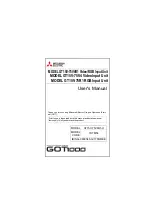
20
• It is forbidden to use the lift to lift people or animals.
• It is forbidden to lift vehicles with people or animals onboard.
• It is forbidden to use the lift if the room temperature is below 5°C or above 40°C.
• It is forbidden to voluntarily cause load oscillations during lifting or lowering manoeuvres, or while load is lifted.
• It is forbidden to access the working area under the lift without having enabled safety mechanical devices, and turned disconnector to 0.
• It is forbidden to leave the lift unattended without having positioned it at the min. height or in mechanical safety position. Then section power supply,
and lock disconnector using a padlock.
• It is forbidden to remove or change lift protections or safety devices.
• It is forbidden to change lift or lift parts, any tampering with or change will immediately invalidate warranty, and will relieve manufacturer of any direct
or indirect liability for damages due to such tampering or changing operations.
• It is forbidden to use parts or accessories not supplied by the manufacturer.
3.0 GENERAL SAFETY AND ACCIDENT-PREVENTION RULES
3.1 SET-UP AND CLOTHING
Set up a space suitable for the machine, and the working environment, by carefully evaluating the following aspects:
• The position shall be safe, free from any hinder, and protected against atmospheric agents. From the control position, the operator shall
be able to see the whole system and the working area, and to immediately detect the presence of unauthorised persons and objects that
could originate any danger.
• The min. distance of the hazardous area from the walls of the premises where the vehicle lift is installed shall be at least 70 cm. Lighting
shall be good, but without blinding or intense lights, and there shall be no sources or processes that could develop gases or flammable
vapours.
• Avoid wearing unsuitable clothing. They could get entangled in lift moving parts. As disposed by the National prevailing rule, besides
wearing clothes suitable to the work site, the operator will have to compulsorily wear complementary protective accessories to prevent
any injury, such as: helmet, goggles, gloves, suitable shoes, etc.
3.1.2 PERMANENTLY IMMOBILISING THE ARMS
• WARNING: never remove the arm immobiliser screws for any reason. This device is required for compliance with regulation 1493:2010.
The company cannot be held liable for any damage or injury caused by incorrect use of the lift. Removing this device (Fig. 6A), which is
installed on the carriage by the constructor, causes the lift to no longer comply with applicable legislation.
3.2 ENVIRONMENT AND POLLUTION
• Lift shall not be used for vehicle washing, degreasing, sandblasting and grinding.
• Comply with the National prevailing standards relating to the use and disposal of the products used for lift cleaning and maintenance,
respecting the manufacturer’s recommendations.
• Traps and drainage ditches shall discharge fluids, where and as indicated by the National prevailing standards.
3.3 LIFT SCRAPPING
When decommissioning and scrapping the lift, DO NOT dispose of the materials and components as normal refuse. Contact a specialised
waste handling company.
To avoid any environmental pollution risks, take the following precautions:
• The oil contained inside hydraulic control unit, relative circuit and cylinders shall be fully collected. (if available).
• Disassemble lift parts by dividing them into groups of the same material in order to proceed to their separate disposal.
• Exhausted hydraulic oil, rubber parts, and iron scraps are special waste. Dispose of or temporarily store them in compliance with the
National prevailing anti-pollution standards.
Summary of Contents for ERCO 3222N CEL
Page 2: ......
Page 8: ...8 1 2 DIMENSIONI INGOMBRO 2585 85 130 6 0 0 9 4 0 1250 850 1870 1915 2570 3230 2480...
Page 12: ...12 POSIZIONE OPERATORE 1 6 ZONE A RISCHIO Fig 7 700 700 5000...
Page 16: ...16 Fig 16 5 6 7 2 4 3...
Page 31: ...31 9 0 SCHEMA ELETTRICO...
Page 32: ...32...
Page 33: ...33 FU1 FU3 KM1 KM2 KM3 KM4 FU2 TC1 CB2C NT...
Page 36: ......
Page 42: ...8 1 2 OVERALL DIMENSIONS 2585 85 130 6 0 0 9 4 0 1250 850 1870 1915 2570 3230 2480...
Page 46: ...12 700 700 5000 POSITION OPERATOR 1 6 HAZARDOUS AREAS Fig 7...
Page 50: ...16 Fig 16 5 6 7 2 4 3...
Page 65: ...31 9 0 ELECTRONIC CIRCUIT BOARD DIAGRAM...
Page 66: ...32...
Page 67: ...33 FU1 FU3 KM1 KM2 KM3 KM4 FU2 TC1 CB2C NT...
Page 70: ......
Page 76: ...8 1 2 DIMENSIONS D ENCOMBREMENT 2585 85 130 6 0 0 9 4 0 1250 850 1870 1915 2570 3230 2480...
Page 80: ...12 700 700 5000 POSITION OPERATEUR 1 6 ZONES A RISQUE Fig 7...
Page 84: ...16 Fig 16 5 6 7 2 4 3...
Page 99: ...31 9 1 SCHEMA CARTE ELECTRONIQUE...
Page 100: ...32...
Page 101: ...33 FU1 FU3 KM1 KM2 KM3 KM4 FU2 TC1 CB2C NT...
Page 104: ......
Page 110: ...8 1 2 ABMESSUNGEN 2585 85 130 6 0 0 9 4 0 1250 850 1870 1915 2570 3230 2480...
Page 114: ...12 700 700 5000 POSITION BEDIENER 1 6 GEFAHRENBEREICHE Abb 7...
Page 118: ...16 Abb 16 5 6 7 2 4 3...
Page 133: ...31 9 1 SCHEMA DER PLATINE...
Page 134: ...32...
Page 135: ...33 FU1 FU3 KM1 KM2 KM3 KM4 FU2 TC1 CB2C NT...
Page 138: ......
Page 144: ...8 1 2 DIMENSIONES TOTALES 2585 85 130 6 0 0 9 4 0 1250 850 1870 1915 2570 3230 2480...
Page 148: ...12 700 700 5000 POSICI N OPERADOR 1 6 ZONAS EN RIESGO Fig 7...
Page 152: ...16 5 6 7 2 4 3 Fig 16...
Page 167: ...31 9 1 ESQUEMA TARJETA ELECTR NICA...
Page 168: ...32...
Page 169: ...33 FU1 FU3 KM1 KM2 KM3 KM4 FU2 TC1 CB2C NT...
Page 172: ......
Page 173: ......
















































